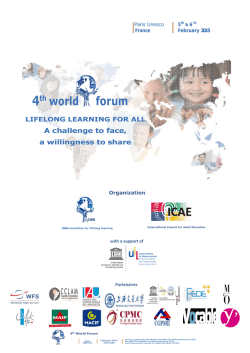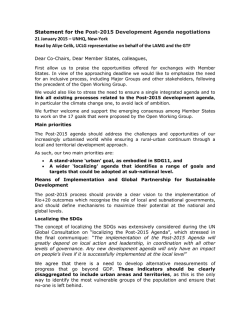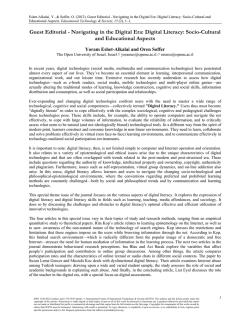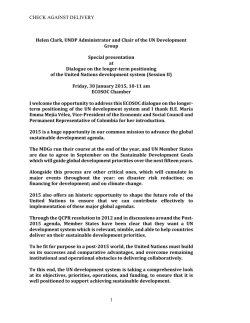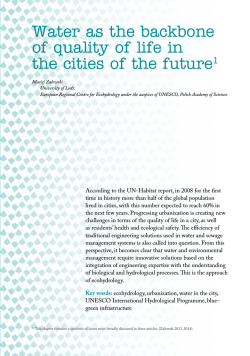
Joint Proposal of the EFA Steering Committee on Education Post-2015
Joint Proposal of the EFA Steering Committee on Education Post-2015 Introduction The Education for All (EFA) Steering Committee – a representative body of key education stakeholders 1 convened by UNESCO – developed this Joint Proposal on Education beyond 2015, which was presented and discussed at the Global EFA Meeting (GEM) in Oman (12-14 May 2014). This Joint Proposal is based on UNESCO’s Position Paper on Education beyond 2015, which was discussed and strongly supported by the 194th session of UNESCO’s Executive Board in April 2014. The GEM adopted a Final Statement – the ‘Muscat Agreement’ – that outlines the proposed overarching goal and global targets of the post-2015 education agenda. The aim of this Statement, together with the Joint Proposal, is to facilitate Member States’ discussions and negotiations on the global post-2015 development agenda in New York and form the core of the Framework of Action to be adopted at the World Education Forum 2015 in the Republic of Korea in May 2015. Vision and principles of the post-2015 global education agenda Education is a fundamental human righti and a foundation for human fulfilment, peace, sustainable development, economic growth, decent work, gender equality and responsible global citizenship. Furthermore, it is a key contributor to the reduction of inequalities and the eradication of poverty, by bequeathing the conditions and generating the opportunities for just, inclusive and sustainable societies. As such, education must be a stand-alone goal in the broader post-2015 development agenda and should be framed by a comprehensive overarching goal, with measurable global targets and related indicators. In addition, education must be integrated into other development goals in order to highlight their mutual interdependence and catalyze more synergistic action across sectors. The post-2015 global education agenda should be rights-based and adopt a perspective based on equity and inclusion, expanding the vision of access to reflect relevant learning outcomes through the provision of quality education at all levels. It should take a holistic and lifelong learning approach, and ensure that no one is left behind. Moreover, the agenda should be of universal relevance and mobilize all countries and stakeholders, regardless of their development status. While the state is the custodian of education as a public good, the role of civil society, communities, parents, learners and other stakeholders is crucial in the provision of quality education. The global education agenda should be complemented by a ‘Framework for Action’ to guide countries in operationalizing the global education agenda at country/national level, including setting their targets and indicators, and reflecting the diverse social, political, economic and cultural contexts. The Framework for Action should include an implementation strategy in which necessary operational mechanisms, supporting actions and enabling conditions for the implementation of global targets at national level – including partnerships, financial requirements, governance and accountability and monitoring – are spelled out. 1 The EFA Steering Committee is composed of Member States representing all six regional groups of UNESCO, the E-9 initiative, and the host country of the World Education Forum 2015; the five EFA convening agencies (the United Nations Educational, Scientific and Cultural Organization, the United Nations Children's Fund, the United Nations Development Programme, the United Nations Population Fund and the World Bank); the Organisation for Economic Co-operation and Development; the Global Partnership for Education, civil society, the teaching profession and the private sector. 1 Overarching goal “Ensure equitable and inclusive quality education and lifelong learning for all by 2030” is proposed as the overarching education goal. This goal may not be measured as such, but must be translated into specific global targets and corresponding indicators. The targets are specific and measurable, and contribute directly to the achievement of the goal. Countries are expected to commit to the goal and targets, against which they can be held accountable. Targets The proposed seven targets can be classified into two types: outcome and input targets. Five are outcome and two are input targets, the latter being considered crucial for the realization of the former. Minimum global benchmarks for these will be developed, based on which countries may wish to set more ambitious national benchmarks. All targets have been identified through extensive consultations and take into account the following imperatives for education: ▪ ▪ ▪ ▪ ▪ ▪ ▪ the right to free education should be promoted in accordance with the International Covenant on Economic, Social and Cultural Rights, which affirms that education shall be compulsory and free at the primary education level, and be progressively free at the secondary and higher education levels;ii a special focus on equity and inclusioniii is required. Therefore, the future agenda must pay particular attention to marginalized groups and to those affected by conflict and disaster. This should be reflected in the targets and/or through indicators that measure and monitor inequalities; where possible, data should be disaggregated, for example by age, sex, location, ethnic/linguistic identification, and disability and socio-economic status, in order to enable effective measurement of equity gaps. Targets should only be considered achieved if they are met for all relevant income and social groups; gender equality to, in and through education remains a key concern requiring continued and central attention. Gender equality should be explicitly included either directly in the target or in the indicators, with a renewed focus on enhanced access and transition to and completion of basic, secondary and higher education for both girls and women in gender-sensitive, -responsive and -transformative learning environments that are safe and supportive; quality education and learning at all levels and in all settings should be at the heart of the post-2015 education agenda. The World Education Forum (Dakar, Senegal, April 2000) identified the key elements of quality educationiv, which include, among others, inputs, processes, content, outcomes and systems. The role of teachers in this regard is of importance; lifelong learningv is a central principle of the post-2015 education agenda, and flexible lifelong and life-wide learning opportunities should be provided through formal and nonformal pathways and stimulate informal learning; approaches such as global citizenship education vi and education for sustainable development vii , which foster attitudes and behaviours that promote peace, conflict resolution and mutual understanding, tolerance, critical thinking and respect for cultural diversity and for the environment, must be a key component of the future education agenda and should thus be reinforced; and information and communication technologies (ICTs) are important and innovative enablers for education that, if used appropriately, can significantly increase its quality. It should be noted that in order to be holistic and aspirational, the post-2015 education agenda will comprise targets in areas that may not (yet) be measurable in a quantitative or qualitative way. The 2 setting of the global education agenda should start from the broad aspirations of the global community, and not merely reflect indicators that currently exist. Policy imperatives should drive measurement, not vice-versa. I. OUTCOME TARGETS Target 1: By 2030, at least x%* of girls and boys are ready for primary school through participation in quality early childhood care and education, including at least one year of free and compulsory pre-primary education, with particular attention to gender equality and the most marginalized. *Minimum global benchmarks will be developed Early childhood care and education (ECCE) lays the foundation for children’s long-term well-being and educational achievement. Beginning at birth, the years before children start school are critical for building the competencies and skills that affect learning across all areas, as well as health and well-being throughout life. Despite a clear recognition of the importance of ECCE and progress made in addressing young children’s needs, in many parts of the world young children do not receive adequate care or participate in pre-primary education. This target, which takes a holistic approach, is required because of its immediate and long-term positive impact not only on the development of children, but also on the social and economic development of societies. It specifies that at the very least, one year of good quality compulsory and free pre-primary education, which is understood as part of basic education, should be provided. ECCE refers to the range of inputs required to reach children’s developmental potential, including adequate health, nutrition, stimulation within the home and school environments, protection from violence, and attention to all domains of development. The point at which children begin school is an important transition, often accompanied by increasing expectations as to what children should know and be able to do. ‘Readiness for school’ refers to the achievement of developmental milestones across a range of domains, including the adequate health, nutritional status and ageappropriate language, cognitive and social/emotional development of a child at the start of primary school. Target 2: By 2030, all girls and boys complete free and compulsory quality basic education of at least 9 years and achieve relevant learning outcomes, with particular attention to gender equality and the most marginalized. Despite significant progress since 2000, 57 million children of primary school-age and 69 million children of lower secondary school age – of whom girls remain the majority – are still out of school.viii In addition, too often those in school are not acquiring basic knowledge and skills, with at least 250 million primary school-age children around the world, more than 50% of whom have spent at least four years in school, not able to read, write or count well enough to meet minimum learning standards.ix Therefore, this target responds to the expressed need of countries to expand the participation of all children in education to at least a full cycle of basic education, and to improve learning outcomes. Basic education should include a full cycle of at least 9 years of free and compulsory primary and lower secondary education, acknowledging that the definition of basic education varies according to the country context and can progress beyond.x Basic education should be provided to all without discrimination based on gender, ethnicity, disability, income level, language or geographical 3 location. While the key objective is to ensure that all children enter and complete a full cycle of formal basic education at the appropriate age, every effort should be made to provide equivalency basic education for out-of-school children and adolescents who did not have the opportunity to receive or complete formal basic education. It is expected that upon completion of the full cycle, all children will have achieved at least basic learning outcomes as defined by and measured against recognized learning standards. These learning outcomes, to be measured at the end of primary and/or lower secondary education, should include cognitive and foundational as well as non-cognitive/transversal/'21st century' skills.xi While learning outcomes are increasingly highlighted as the ultimate indicator for quality education, it is important that the necessary inputs and processes be in place in order to lead to these outcomes. These include: providing content that is relevant to all learners and the context in which they live; being taught by well-qualified teachers using appropriate pedagogical approaches; and establishing learning environments that are safe, healthy, gender-responsive, inclusive and conducive to learning, provide comprehensive sexuality educationxii, encompass mother tonguebased multilingual education, and harness the potential of ICTs to support teaching and learning. Target 3: By 2030, all youth and at least x%* of adults reach a proficiency level in literacy and numeracy sufficient to fully participate in society, with particular attention to girls and women and the most marginalized. *Minimum global benchmarks will be developed Youth and adult literacy remains a key global challenge. Worldwide, some 774 million adults (aged 15 and over), of whom two-thirds are women, are reported to be unable to read and write.xiii Low literacy skills are a concern globally, including in middle and high income countries. For example, in Europe, an estimated 20% of adults lack the literacy skills they need to function fully in society.xiv Adults with poor literacy skills face multiple sources of disadvantage. They are more likely to be unemployed, and those who are employed receive lower wages. They also find it more difficult to participate in society and exercise their rights. Finally, they are more likely to be in poor health. The development benefits of literacy, in particular for women, are well-documented and include, among others, higher participation in the labour market, delayed marriage and improved child and family health and nutrition; these, in turn, contribute to poverty reduction, greater life opportunities for girls and women, and a positive impact on learning, among other benefits. In general, literacy is considered a prerequisite for personal, social, economic and political empowerment and an essential means of building people’s capabilities to cope with the evolving challenges and complexities of life, culture, economy and society.xv Consequently, it is key to ensure that all youth (15–24 years) and adults across the world acquire relevant and recognized functional literacy and numeracy skills xvi and continue as lifelong learners. It is important to note that the definition of literacy has evolved from a narrow divide between literate and illiterate and is rather understood as a continuum. As such, literacy is defined as the ability to identify, understand, interpret, create, communicate and compute using printed and written materials associated with diverse contexts. Literacy involves a continuum of learning in enabling individuals to achieve his or her goals, develop his or her knowledge and potential and participate fully in community and society.xvii ICTs can play an important role in supporting and sustaining literacy learning. 4 Target 4: By 2030, at least x%* of youth and y%* of adults have the knowledge and skills for decent workxviii and life through technical and vocational, upper secondary and tertiary education and training, with particular attention to gender equality and the most marginalized. *Minimum global benchmarks will be developed In the light of socio-economic and demographic transformations including shifting labour markets, growing youth unemployment, migration trends and technological advancements, and the demand for a more knowledgeable and skilled workforce, transformed and intensified approaches to knowledge and skills for decent work and life are required. These are challenges that all countries must meet and which require the identification of policy options that effectively enlarge the relevant skill sets of youth, improve education to work transitions, and enhance adult up-skilling and reskilling. Knowledge and skills for work and life can be acquired through different streams and forms of post-basic education and training including upper secondary and tertiary education and technical and vocational education and training as well as adult education and non-formal skills training in a life-long learning perspective. Education systems should facilitate pathways between different education streams and the transition between school and work. Work-based learning is also a key path to skills development for many young people and adults. Enterprises should provide opportunities for work-based learning and lifelong learning. In addition, there is growing evidence that beyond mastering work-specific skills, there is an increasing demand for information-processing skills and other high-level cognitive and interpersonal skillsxix. Therefore, learners will increasingly be required to acquire those knowledge, skills and competences needed to be creative and innovative, able to adapt to and assimilate change and to continue learning, and navigate a technology-intensive world. Today, policies for skills development should speak not only to the challenges of youth employability and unemployment, but also address the consequences of ageing labour forces and rapidly-changing skill needs. Well-designed education systems can enable adult workers to keep their skills current and improve their productivity, and thereby contribute to extended careers of productive employment in a life-long learning perspective. Target 5: By 2030, all learners acquire knowledge, skills, values and attitudes to establish sustainable and peaceful societies, including through global citizenship education and education for sustainable development. Strengthening the ways in which education contributes to the fulfilment of human rights, peace, responsible citizenship, gender equality, sustainable development, health, respect for cultural diversity and intercultural dialogue deserves a central place in the post-2015 education agenda. The knowledge, skills, values and attitudes required by citizens to take informed decisions and assume active roles both locally and globally in facing and resolving global challenges can be acquired through global citizenship education (GCE) and education for sustainable development (ESD). GCE and ESD aim at empowering learners of all ages to contribute to sustainable development and take responsible actions for environmental integrity, economic viability and a just society for present and future generations, and to ultimately become proactive contributors to a more just, 5 peaceful, tolerant, inclusive, secure and sustainable world. They promote skills such as critical thinking, understanding complex systems, imagining future scenarios, and making decisions in a participatory and collaborative way. In addition, culture plays a key role in achieving sustainability, and therefore education should take into account local conditions and culture as well as build awareness of cultural expressions and heritage. Building on existing toolsxx, it will be important to develop additional measures that can help monitor progress at the global level in these areas. II. INPUT TARGETS Target 6: By 2030, all governments ensure that all learners are taught by qualified, professionallytrained, motivated and well-supported teachers*. *National benchmarks and/or targets and scaled timeline should be developed Ensuring quality and relevant teaching and learning is central to the post-2015 education agenda. One of the key conditions to ensuring quality education is ensuring that every learner is taught by a qualified and professionally-supported teacher. Education quality is presently undermined by the urgent need for additional teachers in classrooms: 1.6 million are required to achieve universal primary education by 2015 and 5.1 million to achieve universal lower secondary education by 2030. Moreover, recruiting teachers to fill vacant posts is not enough. Young people entering the profession must have received at least secondary schooling of appropriate quality and relevance; they also require rigorous initial teacher education which, among other qualities, prepares trainees to instruct students from diverse backgrounds using a wide array of teaching methodologies and to support those who need the greatest attention. All teachers require continuing professional development and support to enable them to reflect on their teaching practices and adapt to changing conditions. They also need decent working conditions and adequate and timely remuneration. The uneven allocation of trained teachers is a key contributing factor to wide equity gaps in learning. Governments must therefore devise strategies and provide appropriate incentives, including competitive remuneration, clear career paths and professional development. Finally, teachers themselves are also responsible for improving the learning outcomes of students. This target, as one of the most important enablers of achieving all of the other targets, will require a shorter and/or scaled timeline. Target 7: By 2030, all countries allocate at least 4-6% of their Gross Domestic Product (GDP) or at least 15-20% of their public expenditure to education, xxi prioritizing groups most in need; and strengthen financial cooperation for education, prioritizing countries most in need. The full realization of the education agenda beyond 2015 requires innovative, increased and welltargeted financing and efficient implementation arrangements. There must be a clear, renewed commitment by governments to provide equitable financing commensurate with national educational priorities. Although domestic allocation to education should be based on each country’s needs and capacities as well as demographic trends (i.e. some countries have an ageing population and fewer children, impacting on the financial requirements for education), it is proposed that countries either choose one of the two following minimum global benchmarks or use both: the allocation of at least 4-6% of their Gross Domestic Product (GDP); and/or the allocation at least (15-20%) of their public expenditure to education – using funds effectively and prioritizing groups most in need. At the same time, strengthened financial cooperation for education from all stakeholders is also required; this includes support from multilateral and bilateral support to education for committed 6 but under-resourced countries, funding from the private sector and innovative financing towards nationally-set targets. This support should be clearly expressed in the implementation strategy of the new agenda. Furthermore, coordination, monitoring and evaluation are required at the global and country levels in order to ensure that all funding, including from external sources, are used effectively and efficiently and with measurable outcomes and impacts for individuals and societies. As adequate financing is critical to the implementation of the future education agenda, immediate measures should be taken to increase both domestic and international commitment to funding education. Operationalization of the post-2015 global education agenda The post-2015 global education agenda should enable all countries to realize their own vision and ambitions for education, while holding them accountable to an internationally-agreed goal and targets. As countries differ in their educational priorities and the ways in which they structure responsibility, the post-2015 education agenda must be flexible enough to address this diversity. It should therefore strike a balance between global targets and their adaptations at country level, aligning the former to common indicators that can be measured and compared across countries and over time, while providing for specific target setting and indicator development at the country level that reflect specific priorities and contexts. A possible approach could be for some targets to be phrased in terms of ensuring that basic minimum standards are met by all, irrespective of context, while others could be phrased in terms of a ‘global ambition’ for improvement, with more specific and tailored targets defined at the national level. Each government could set an appropriate level of ambition for each target, taking account of its starting point, its capacity and the resources it can expect to command. The indicators that track the targets should be disaggregated in different ways to ensure equality, nondiscrimination and the overcoming of different forms of exclusion. The implementation of the new education agenda will require adequate and effective financing, through domestic government resources, public-private partnerships, innovative financing and international aid, as mentioned above. Effective financing must be accompanied by strengthened participatory governance and accountability mechanisms at the global, national and local levels, as well as improved planning, monitoring and reporting mechanisms and processes. It will also require partnerships at country level, involving a multiplicity of stakeholders who can contribute to the common goal of quality education for all. Education beyond 2015 should build on existing alliances and networks, including the regional and global EFA structures and mechanisms, and forge a broader and stronger coalition of partners at the regional and global levels. This coalition – an integral part of the overall development framework and related mechanisms – should include governments, multilateral and bilateral organizations, civil society, academia and the private sector, and encompass expertise from sectors related to education such as labour, welfare and health. Monitoring and accountability mechanisms should be based on initiatives at the country level, with UNESCO and other relevant partners supporting Member States to develop institutional capacities towards that purpose, and in such a way that country-level systems develop and provide comparable information and indicators, fostering greater accountability in education governance. At the same time, regular and independent monitoring to track progress at global level is fundamental; therefore mechanisms such as the current EFA Global Monitoring Report should be maintained, with regular opportunities to discuss results at a high political level. 7 ANNEX I OVERARCHING GOAL Ensure equitable and inclusive quality education and lifelong learning for all by 2030 I. OUTCOME TARGETS Target 1: By 2030, at least x% of girls and boys are ready for primary school through participation in quality early childhood care and education, including at least one year of free and compulsory pre-primary education, with particular attention to gender equality and the most marginalized. Target 2: By 2030, all girls and boys complete free and compulsory quality basic education of at least 9 years and achieve relevant learning outcomes, with particular attention to gender equality and the most marginalized. Target 3: By 2030, all youth and at least x% of adults reach a proficiency level in literacy and numeracy sufficient to fully participate in society, with particular attention to girls and women and the most marginalized. Target 4: By 2030, at least x% of youth and y% of adults have the knowledge and skills for decent work and life through technical and vocational, upper secondary and tertiary education and training, with particular attention to gender equality and the most marginalized. Target 5: By 2030, all learners acquire knowledge, skills, values and attitudes to establish sustainable and peaceful societies, including through global citizenship education and education for sustainable development. II. INPUT TARGETS Target 6: By 2030, all governments ensure that all learners are taught by qualified, professionally-trained, motivated and well-supported teachers. Target 7: By 2030, all countries allocate at least 4-6% of their Gross Domestic Product (GDP) or at least 15-20% of their public expenditure to education, prioritizing groups most in need; and strengthen financial cooperation for education, prioritizing countries most in need. 1 Notes i Article 26, Universal Declaration of Human Rights (1948), the UNESCO Convention against Discrimination in Education (1960), and the Convention of the Rights of the Child (1990). ii The International Covenant on Economic, Social and Cultural Rights (1966) states that „(a) Primary education shall be compulsory and available free to all; (b) Secondary education in its different forms, including technical and vocational secondary education, shall be made generally available and accessible to all by every appropriate means, and in particular by the progressive introduction of free education; (c) Higher education shall be made equally accessible to all, on the basis of capacity, by every appropriate means, and in particular by the progressive introduction of free education.‟ Available at: http://www.ohchr.org/EN/ProfessionalInterest/Pages/CESCR.aspx. iii „Equity requires securing all children‟s rights to education, and their rights within and through education to realize their potential and aspirations. It also requires implementing and institutionalizing arrangements that help ensure all children can achieve these aims.‟ „Inclusion requires responding to the diversity of needs among all learners, through increasing participation in learning, cultures, and communities, and reducing exclusion from and within education. It involves changes in content, approaches, structures, and strategies, driven by a common vision that covers all children and the conviction that it is the responsibility of the regular system to educate all of them.‟ See: UNGEI, UNAIDS and FTI Secretariat. 2010. Equity and Inclusion in Education: A guide to support education sector plan preparation, revision, and appraisal Fast Track initiative. UNGEI. First edition, April 2010, p.3. Available at: http://www.unicef.org/education/files/Equity_and_Inclusion_Guide.pdf iv EFA Goal 6: Quality Education:„Governments and all other EFA partners must work together to ensure basic education of quality for all, regardless of gender, wealth, location, language or ethnic origin. Successful education programmes require: i) healthy, well-nourished and motivated students; ii) welltrained teachers and active learning techniques; iii) adequate facilities and learning materials; iv) a relevant curriculum that can be taught and learned in a local language and that builds upon the knowledge and experience of the teachers and learners; v) an environment that not only encourages learning but is welcoming, gender-sensitive, healthy and safe; vi) a clear definition and accurate assessment of learning outcomes, including knowledge, skills, attitudes and values; vii) participatory governance and management; and viii) respect for and engagement with local communities and cultures.‟ UNESCO. (2000). Dakar Framework for Action, paragraph 44. Available at: http://unesdoc.unesco.org/images/0012/001211/121147e.pdf v „Lifelong learning is founded in the integration of learning and living, covering learning activities for people of all ages (children, young people, adults and elderly, whether girls or boys, women or men) in all life-wide contexts (family, school, community, workplace and so on) and through a variety of modalities (formal, non-formal and informal) that together meet a wide range of learning needs and demands. Education systems that promote lifelong learning adopt a holistic and sector-wide approach involving all sub-sectors and levels to ensure the provision of learning opportunities for all individuals.‟ UNESCO Education Sector Technical Notes, Lifelong Learning, February 2014, p.2. Available at: http://www.unesco.org/new/en/education/themes/strengthening-education-systems/qualityframework/technical-notes/ vi Global citizenship education aims to equip learners with the following core competencies: • A deep knowledge of global issues and universal values such as justice, equality, dignity and respect; • Cognitive skills to think critically, systemically and creatively, including adopting a multi-perspective approach that recognizes different dimension, perspectives and angles of issues; • Non-cognitive skills including social skills such as empathy and conflict resolution, and communicative skills and aptitudes for networking and interacting with people of different backgrounds, origins, cultures and perspectives; • Behavioural capacities to act collaboratively and responsibly, and to strive for collective good. 2 See the outcome document of the Technical Consultation on Global Citizenship Education: UNESCO. 2013. Global Citizenship Education: An Emerging Perspective”. Available at: http://unesdoc.unesco.org/images/0022/002241/224115E.pdf vii See: UNESCO‟s 37 General Conference approved Global Action Programme on ESD. Available at: http://unesdoc.unesco.org/images/0022/002243/224368e.pdf th viii UNESCO. 2014. EFA Global Monitoring Report 2013/4: Teaching and Learning – Achieving quality for all. Paris: UNESCO Publishing. ix UNESCO. 2012. Education for All Global Monitoring Report: Youth and Skills –Putting education to work. Paris: UNESCO Publishing. x Basic education is defined here as corresponding to the first 9 years of (formal) schooling/education, which is the accumulative duration of ISCED 1 and 2, ISCED 1 being the primary level typically lasting 6 years (with variation between 4 to 7 years) and ISCED 2 referring to the lower secondary, typically lasting for 3 years (with variation across countries). Basic education is also central to the right to education, and it is recognized in every international and regional text as a fundamental human right. The 1960 UNESCO Convention against Discrimination in Education (Available at: http://unesdoc.unesco.org/images/0011/001145/114583e.pdf#page=118) advocates for free and compulsory primary education as a right and recommends this right to be extended to (lower) secondary as much as possible. Most countries today refer to 9 years of compulsory basic education in their education laws or constitutions. Based on these rationales, basic education is defined in this document as 9 years of continuous schooling. UNESCO .2007. Experts‟ Consultation on the Operational Definition of Basic Education. 17-18 December 2007 – Conclusion. Available at: http://unesdoc.unesco.org/images/0018/001802/180253e.pdf xi Non-cognitive/transversal skills, competencies and values may be defined as: • Critical and innovative thinking: Creativity, entrepreneurship, resourcefulness, application skills, reflective thinking, reasoned decision-making • Interpersonal skills: Presentation and communication skills, leadership, organizational skills, teamwork, collaboration, initiative, sociability, collegiality • Intrapersonal skills: Self-discipline, enthusiasm, perseverance, self-motivation, compassion, integrity, commitment • Global citizenship: Awareness, tolerance, openness, respect for diversity, intercultural understanding, ability to resolve conflicts, civic/political participation, conflict resolution, respect for the environment • Physical and psychological health Healthy lifestyle, healthy feeding, physical fitness, empathy, selfrespect Adapted from: ERI-Net. 2013. Research Programme Research Framework for ‘Integrating Noncognitive Skills in Education Policy and Practice (Phase I)”, Bangkok: UNESCO Bangkok. xii UNESCO. 2009. International Technical Guidance on Sexuality Education, An evidence informed approach for schools, teachers and health educators, volumes I and II. Paris: UNESCO. xiii UNESCO. 2014. EFA Global Monitoring Report 2013/4: Teaching and Learning – Achieving quality for all. Paris: UNESCO Publishing. xiv European Commission. 2012. Final Report: EU High Level Group of Experts on Literacy 2012. Luxembourg: Publications Office of the European Union. xv UIL. 2010. CONFINTEA VI sixth international conference on adult education - Final report. Hamburg: UNESCO Institute for Lifelong Learning. xvi A person is defined as “functionally literate who can engage in all those activities in which literacy is required for effective functioning of his [or her] group and community and also for enabling him [or her] 3 to continue to use reading, writing and calculation for his [or her] own and the community‟s development” (Education for All Global Monitoring Report 2006, p. 30). xvii UNESCO. 2005. Aspects of Literacy Assessment: Topics and issues from the UNESCO Expert Meeting, 10 – 12 June, 2003. Paris: UNESCO. xviii See: http://www.ilo.org/global/about-the-ilo/decent-work-agenda/lang--en/index.htm. xix OECD. 2013. OECD Skills Outlook 2013: First Results from the Survey of Adult Skills. Paris: OECD Publishing. Available at: http://skills.oecd.org/documents/SkillsOutlook_2013_Chapter1.pdf xx Existing tools for the measurement of citizenship and sustainability skills include: measuring civic knowledge and engagement through the International Civic and Citizenship Education Study, tolerance and trust through the World Values Survey or knowledge of environmental issues through PISA. xxi See also: Communique of the Seventh Meeting of the High Level Group on EFA (Dakar, 2007) Available at: http://unesdoc.unesco.org/images/0015/001560/156099e.pdf and Communique of the Sixth Meeting of the High Level Group on EFA (Cairo, 2006). Available at: http://www.unesco.org/education/HLG2006/Communique22Nov.pdf 4
© Copyright 2026
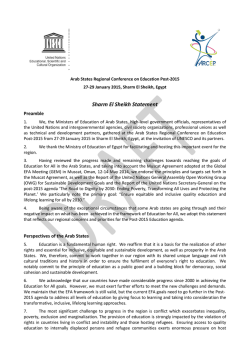
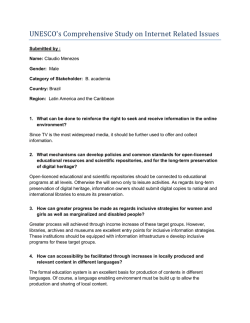
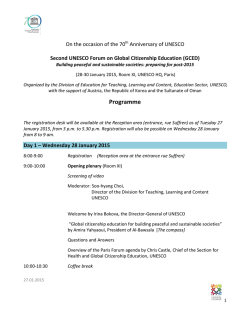
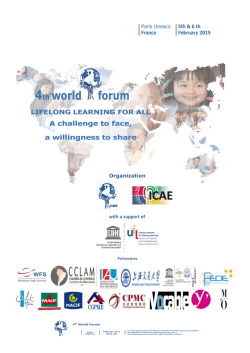
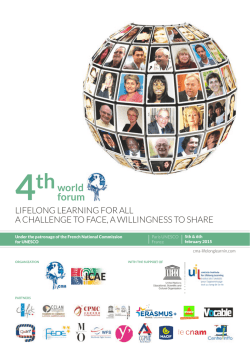
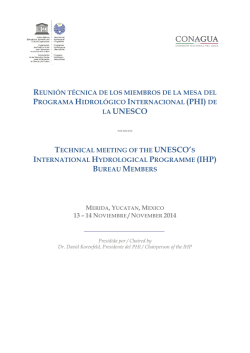
![Flyer on the event [PDF]](http://s2.esdocs.com/store/data/000461133_1-4d88ad04a2122eb11dffd05a58c0a0a8-250x500.png)
